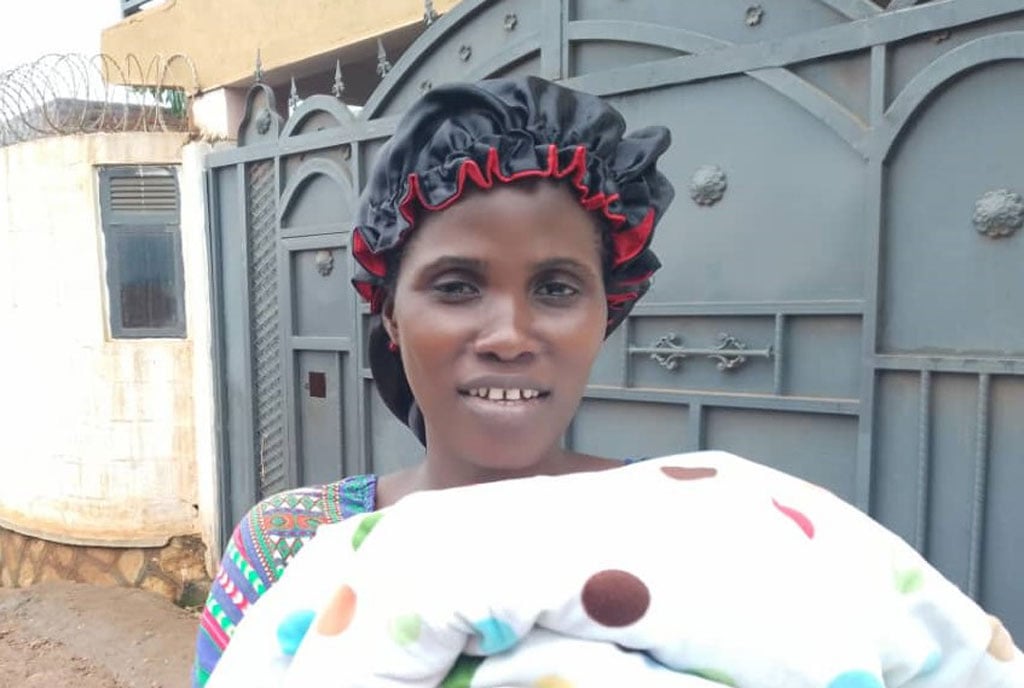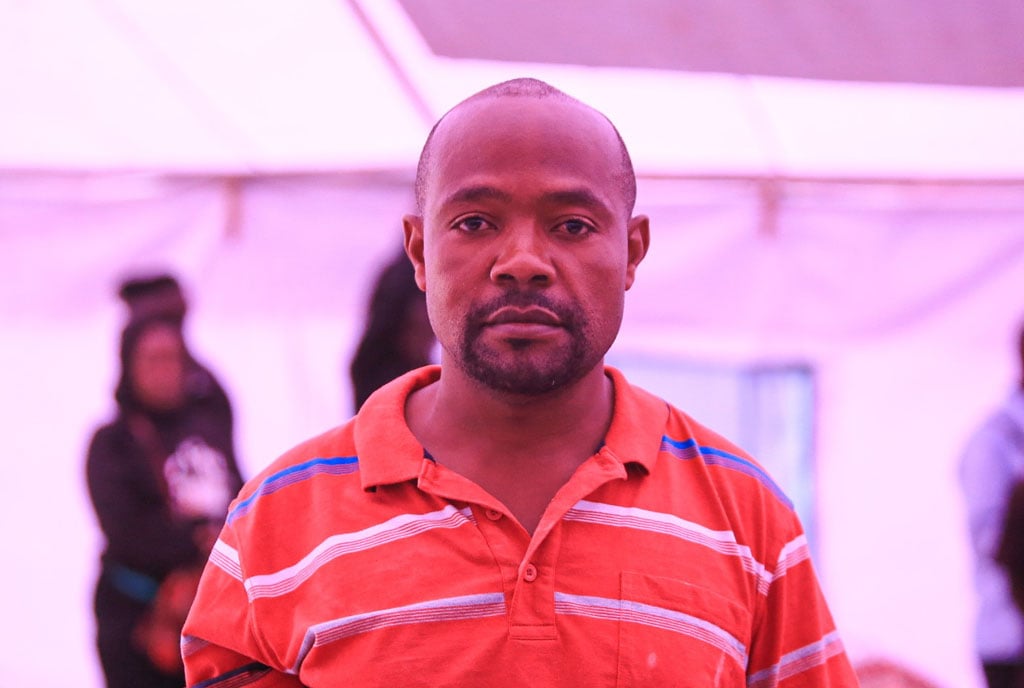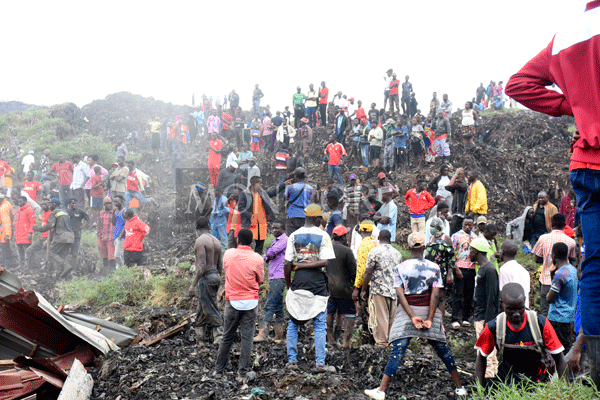
Huzaifah Ssemanda lost his wife and children in the August 10, 2024 Kiteezi landfill collapse. PHOTO/BUSEIN SAMILU
On Saturday, August 10, a part of Kiteezi waste dumpsite in Wakiso District collapsed following what City Hall said was a “structural failure”.
The cause of the crumble is now a subject of a government-commissioned inquiry. By 9pm last evening, police maintained the number of bodies retrieved from beneath the garbage debris was 25, despite fears the death toll was likely to rise with more of the flattened areas to be excavated and local leaders and residents reporting that whereabouts of many remained unknown.
Our Reporters Esther Oluka & Busein Samilu spoke to survivors who recounted moments of confusion, panic and pain in the aftermath of a blast that triggered a thundering sludge.
‘I lost my wife and child within eyesight’
Huzaifah Ssemanda: “I, as usual, woke up at 5am and started playing with my four-month-old baby girl, as I waited start my day. At around 6:40am, my friend and workmate Julius, who usually picks me, called to inform me that he would not make it to my home that day.
Julius normally picks me at 7am before we head to our work place in Kiteezi. So, after that call I decided to prepare and leave since my wife was still sleeping. Little did I know that I would be an unconscious widower within moments!
I heard a loud sound in the direction I was heading to, but I continued to trudge. Few minutes later, I saw the garbage rolling down at high speed and headed in the direction I was coming from. I could have just stepped aside and given the sludge way, but upon calculation, I saw that it was going to my house which prompted me to run back home and save my family. I kept shouting my wife’s name so that she could run out. I was late. The flowing garbage debris was faster than me. It buried my only wife and my only daughter.
Just like that I lost my family. I am a widower who still thinks it’s just a dream. I saw [crushed] trees flying in the air like bows. My house was a two-storied structure constructed using timber. [In the final moments], my aim was to reach home and die with my family at least. The last thing I remember is a big tree banging me in the chest. The rest is history.”
‘‘I survived death by a whisker’’
Juliet Nabakooza, 34: “I survived death narrowly. This is because the collapsed debris ended up a few meters away from my house. My neighbours and our tenants did not survive. I remember that early morning of Saturday, August 10, I got up to [answer the call of nature]. After visiting the toilets, which are inside the house, I checked on my young children. And just as I was covering myself, I heard a loud bang and a little [tremor] … [on] the floor of my house. And just as I was trying to understand what was happening, a heavy stench began to fill the air. It smelled of rotten garbage. I don’t know what time it was and I could not even bother checking because I was very confused. But it was early morning hours, before the break of dawn. I checked on my children, who were crying before running outside the house.

34-year-old landfill collapse survivor Juliet Nabakooza. PHOTO/COURTESY
My husband had not spent the night at home because he was away working. So, upon reaching the compound, I saw piles of rubbish metres away. The piles had submerged houses of my tenants and those of neighbours. I just sat down there and cried. A few hours later, my husband joined us at home and by this time, a black dirty smoke was visible in the air. The government has told survivors still staying within the landfill radius to vacate for our own safety, but where should we go? [The] government should come up with a proper resettlement plan. They should not just talk about relocation without concrete plans.”
“KCCA ignored red flags over waste pile’’
Denis Naturinda, 42, taxi driver says: “What has befallen us is very sad. Before the tragedy struck, we used to complain to Kampala Capital City Authority (KCCA) about the growing pile of rubbish. And whenever they failed to address our concerns, we would protest. The pile of rubbish was a menace to the community, from the stench to being a hub for diseases. The sight of the rubbish was itself a sore for the eyes. When the pile began growing overtime, I personally felt concerned and was worried that one day it would collapse and this misfortune did happen that fateful (Saturday) morning. My working hours as a taxi driver are always unpredictable. On some days, I get up early and on other days, a bit late. The plan for Saturday, August 10, was to be on the road early and so, I got up quite as early as I could, without even checking the time. I just went, showered and prepared myself to get on the road. When I checked outside my house, nobody was out and the surroundings were really quiet. I got my shoes and jumped onto the taxi, packed outside the compound. Besides my car lights, the security lights from various houses were helping me see the road clearly as I began driving. A few metres into the journey, I saw a small group of men and women carrying small sized sacks on their heads and upon greeting them, they said they were going to the aste dumpsite. I teased them saying they should not be walking at such dangerous hours. They giggled and said they were safe. As I continued with my journey, I heard a loud sound which transpired only within a few seconds. It was intense, loud and difficult to comprehend its source. And in just a few minutes, I saw people running and screaming. I got out of the taxi. Moments later, I stumbled upon a man, drenched in dirt and tears who said that the landfill had collapsed. Confused, I drove back to the location of my house, only to find it was no more. It had been crushed under the garbage. It was just my luck. My wife and our two children survived because they were away, visiting in the village. I have told them to remain there until I figure out what to do next. I am currently staying inside a [Uganda Red] Cross [Society-provided] tent erected for affected residents. My request is for the government to resettle us.”

42-year-old taxi driver Denis Naturinda. PHOTO/COURTESY





